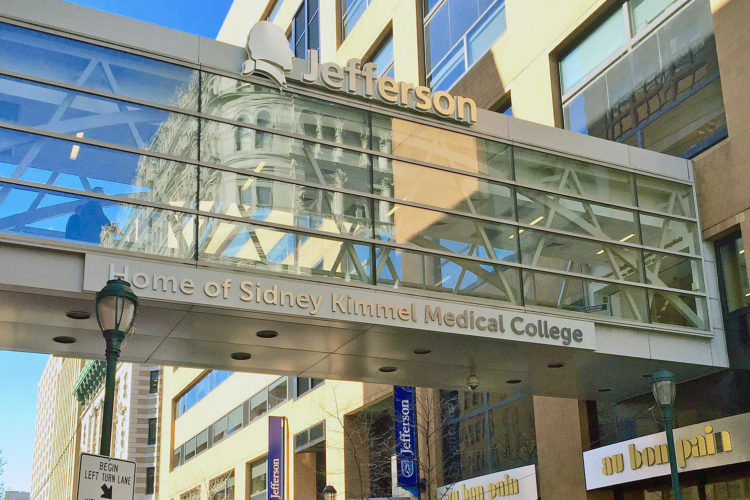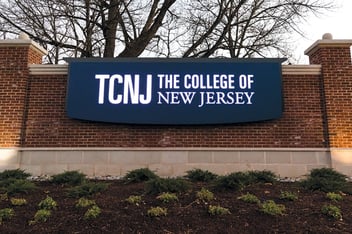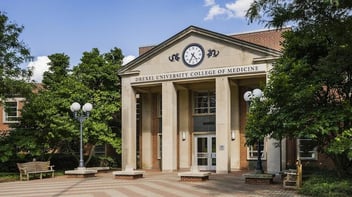Everything You Need to Know About the Pennsylvania State-Jefferson 7-Year Pre-Medical/Medical Program

By: Preeyal P., current 3rd year medical student
What is PMM?
The Penn State-Jefferson Premedical-Medical Program (PMM) is an accelerated seven-year program consisting of three undergraduate years at Penn State followed by four years at Sidney Kimmel Medical College at Thomas Jefferson University. Students are enrolled in the Eberly College of Science at Penn State’s University Park campus and earn a B.S. degree after their first year of medical school. As a PMM student, you will enjoy your undergraduate years in one of the largest universities in the US, in the quaint collegetown of State College, Pennsylvania, and then complete medical school in the lively city of Philadelphia. Along the way, you will explore new interests, build lasting friendships, and enrich your knowledge, all without the stress of applying to medical school!
What is the application process like?
Admission to the program is highly selective. Applicants must score a 1470 or higher on the new SAT, 32 or higher on the ACT, and rank in the top 10% of their high school class. After initially screening for the above criteria, the admissions committee will invite a limited number to interview in February at Sidney Kimmel Medical College. PMM Interview Day consists of a morning of informational sessions, speeches, opportunities to meet current medical students, and tours of the campus. In the morning, applicants will also interview with a medical student. After lunch, applicants interview with faculty physicians, followed by “Cookie Hour,” another opportunity to talk to other applicants and students while enjoying a snack. Applicants are notified of their admissions’ decisions in late March.
What classes will I take?
Unlike some other programs, in which students pursue a traditional major of their choosing, the PMM program is considered its own “Premedical-Medical” major, with a set list of course requirements. The class schedule consists of the typical core premedical courses, as well as “general education” electives. The core classes consist of two semesters of general chemistry, two semesters of calculus, one semester of biology, two semesters of organic chemistry, two semesters of biochemistry, three semesters of physics, as well as biology electives of a student’s choosing. The general education electives are 45 credits worth of courses in the arts, humanities, social sciences, and health, including writing and public speaking, which all students at Penn State are required to take. Several students enter their freshman year with previous AP credit, which conveniently allows them to satisfy many of the introductory-level science, math, and general education requirements. However, students without any prior AP credit are able to fit these classes into their schedules with ease. The flexibility of this schedule allows most PMM students to fulfill the majority of their course requirements within their first two years. As a student, you will be well-equipped with a solid bank of knowledge from your core premedical classes, allowing you to feel prepared when you take the MCAT.
Additionally, many students take advantage of this flexible schedule to complete a minor (and even double majors). The purpose of the program is to give you the typical pre-medical foundation while leaving room for exploration and enrichment in other subjects that interest you. Neuroscience, physics, psychology, health policy and administration, computer science, and biomedical engineering are examples of minors that students have completed in the past.
Prospective students often ask if the condensed, accelerated schedule allows time for study abroad, and the answer is yes! Many PMM students have studied abroad during their third year, to countries including Italy, New Zealand, and China, to name a few. Penn State has extensive study abroad connections, and the Eberly College of Science facilitates many research-abroad programs as well.
Once I’m in the program, how difficult is it to stay in the program?
Students must maintain a science/math GPA of 3.5 each semester and meet an MCAT score requirement of 504 (minimum of 126 in each section) in order to matriculate to SKMC. The core science classes are spread out in a way that no particular semester is overloaded or unfeasible. However, as with any premedical course at any school, classes are difficult. PMM students tend to look out for each other, share resources, and help each other out. Most students meet the GPA requirements without any difficulty. If you do slip up in one semester, the advisors guide you in determining what aspects of your study techniques or schedule you can change and work with you to keep you on track. As long as you meet the 3.5 GPA requirement the next semester, and meet an overall 3.5 GPA requirement at the end of the three years, you will still matriculate to SKMC.
Who has my back?
Adjusting to college is understandably difficult, but there are several people to help you navigate the waters. Dr. Ronald Markle, the PMM program advisor, is an invaluable resource throughout your Penn State experience. In fact, all PMM students are enrolled in a first-year seminar with Dr. Markle during their first semester at Penn State. This seminar class meets once a week and is designed to introduce students to different organizations on campus, develop skills such as study strategies and time management, and serve as a weekly opportunity for students to touch base with Dr. Markle to ask questions.
Additionally, upper year students in the program embrace the entering freshmen and build a strong rapport with them that continues throughout the seven year program and beyond. Older students are eager to help the younger years in all aspects of life at Penn State, from classes, extracurriculars, and research to general tips on where to get the best pizza. This warm sense of camaraderie is truly a hallmark of the PMM program.
What do I do when I’m not in class?
The beauty of an accelerated medical program is that you can spend time on activities you enjoy without the stress of applying to medical school. PMM students are involved in a wide variety of extracurriculars, including academic and professional clubs, the performing arts, intramural and club sports, service organizations, volunteer work, research, and Greek life.
Although it is not required, some PMM students choose to pursue research to gain exposure to the laboratory setting. Generally, students interested in research are able to find lab positions as long as they are proactive in their search, and several resources exist on campus to connect students with research.
Penn State is known for THON, the world’s largest student-run philanthropy dedicated to improving the lives of children impacted by childhood cancer. THON is a year-long fundraising effort culminating in a 48-hour dance marathon, and many Penn State students, including PMM students, participate in the cause.
Penn State’s campus is affectionately called “Happy Valley” for a reason–the students are genuinely very enthusiastic and proud to call themselves Nittany Lions. Penn State loves its sports, especially football, and even though I entered college knowing nothing about football, I was easily swept off my feet by the unparalleled school spirit and unity among the students.
Even though State College is in rural Pennsylvania, the town itself has several things for students to enjoy in their free time. Downtown State College is essentially an extension of campus and features many restaurants, cafes, bars, a weekly farmer’s market, and several shopping options. The campus is also near the base of Mt. Nittany, and it is a popular tradition for students to hike Mt. Nittany before they graduate. The school also sponsors many concerts, events, and festivals to enjoy with your friends as well!
What is life at medical school like?
Sidney Kimmel Medical College, previously known as Jefferson Medical College, is dedicated to molding physicians with the knowledge and skills to effectively serve others. SKMC graduates are particularly known for their clinical skills, which SKMC’s emphasis on humanism excels at developing. In 2017, SKMC adopted a new curriculum known as JeffMD, which integrates scientific, clinical, and professional development into a more cohesive approach and provides earlier clinical exposure. Data from other schools who have adopted a similar systems-based curriculum shows that this educational style better prepares students for the USMLE Step 1 exam and fosters long-term retention of the material.
SKMC has one of the largest medical school classes, and its alumni network is extensive as well, providing students with many opportunities for networking and mentorship throughout medical school and beyond. The faculty and physicians of the Jefferson Health Network truly foster the students to become skilled clinicians, which the impressive residency match lists of previous years can attest to.
Located in the heart of Center City, Philadelphia, SKMC is also in a prime location with many dining and entertainment options, sporting events, festivals, concerts, museums, and more to enjoy with the friends you meet.
Why should I choose the PMM program?
If you know you want to pursue medicine and want to enjoy your undergraduate years exploring your passions, and developing new ones, without the burden of the competitive med school application process, then the PMM program is perfect for you. You get the best of both worlds: undergraduate studies in a quaint collegetown followed by medical school in an energetic city. The classes are no breeze, but PMM does an exceptional job of surrounding you with people who are there to support you. Both Penn State and Jefferson have especially large alumni networks that can connect you with research, shadowing, mentorship, and even job opportunities. Out of the students I have had the pleasure of meeting through PMM, not a single one regrets his or her choice. Whether it is memories of chanting in the football stands or enjoying Penn State’s famous ice cream on the green lawn in front of sunny Old Main, you can look back on your undergraduate years knowing that you didn’t sacrifice any experiences by cutting it one year short. And you can move on to SKMC knowing that an M.D. degree from a fine institution awaits you.





